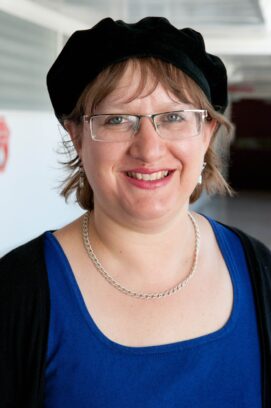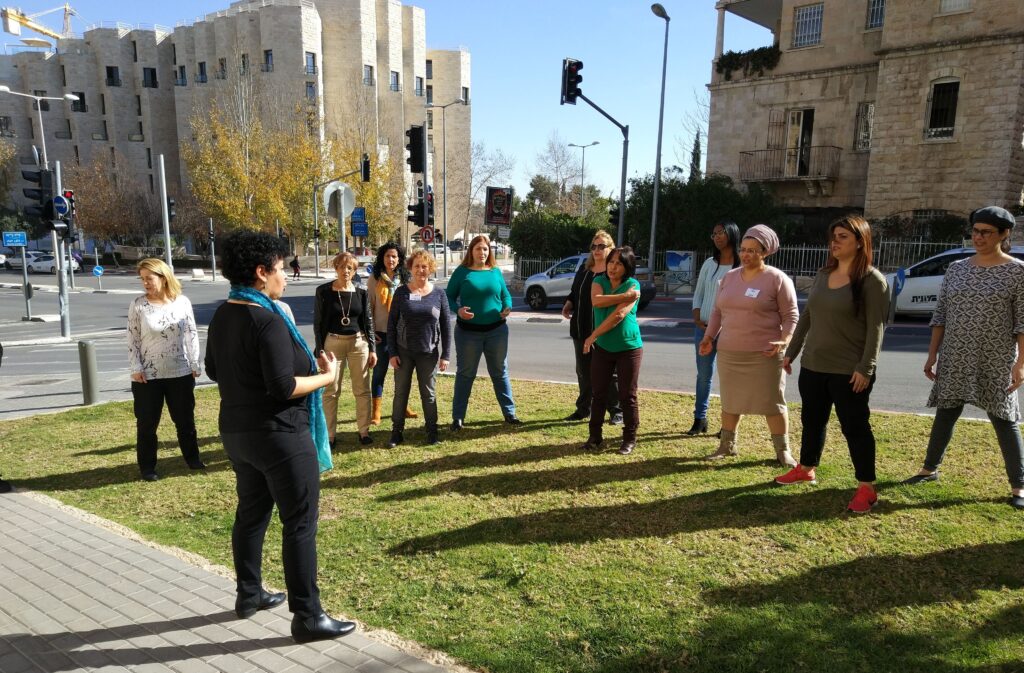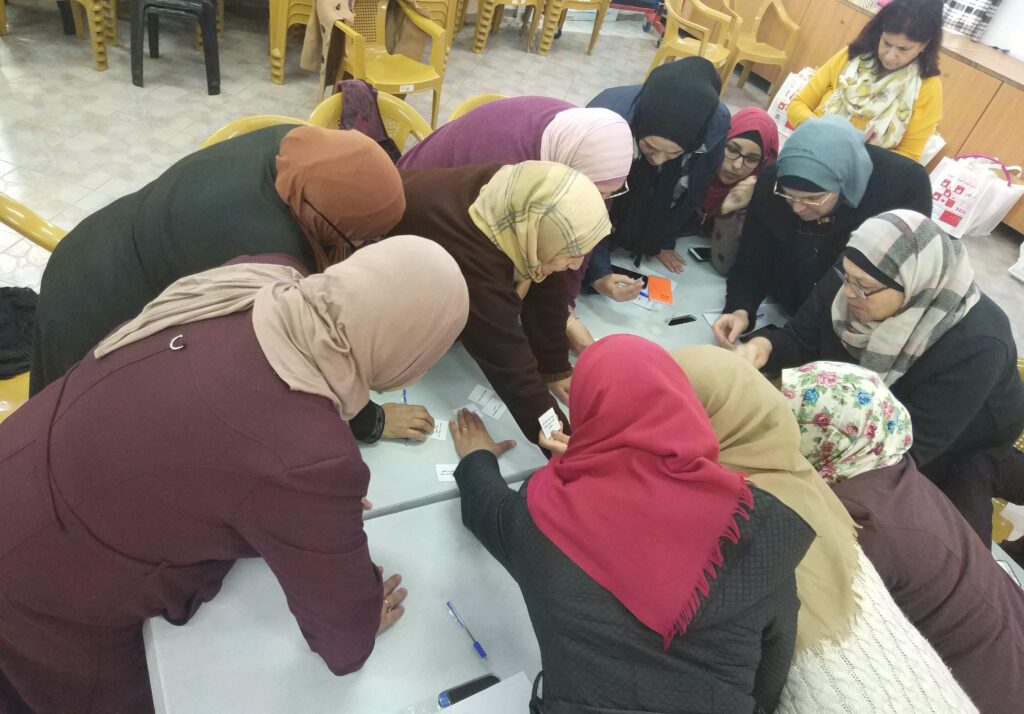Health + Medicine
Feature
Women Helping Women Combat Cardiovascular Disease
Remember Men are from Mars, Women Are from Venus? That the hearts of men and women beat to different drums has long been a tenet of romances and self-help books. Acknowledging the differences in physiology, however, took longer to make its way to medicine, and it’s been scarcely 20 years since the field understood the distinctions between men and women when it comes to heart disease symptoms. Emerging only now is how women working with other women can improve the heart health of an entire nation.
In Israel, as in the United States, where February is heart health month, great strides have been made in understanding the importance of managing cardiac health for women. Much of this change is thanks to a team of remarkable experts brought together at Hadassah Medical Organization’s Linda Joy Pollin Cardiovascular Wellness Center for Women at Hadassah Hospital Ein Kerem. The Pollin center, part of Hadassah’s Heart Institute, conducts female-focused research, serves as an outpatient clinic for women with heart disease and maintains an array of women-led wellness and community programs.
These programs have been life-changing for a broad spectrum of women. Jerusalemite Esti Kraus, for example, saw nothing wrong in her three children snacking on a bar of chocolate with a piece of white bread every day. After Kraus, 26, took part in a Pollin center series, her haredi family’s midmorning snack switched to fresh fruit. Another Pollin program helped Nisreen Salaymeh Shehada, a 49-year-old East Jerusalem mother of six, shed 30 of her 207 pounds. She is working on the next 30 as well as guiding others toward heart-healthy behavior. Hagit Oster, 58, an administrator in the Ministry of Justice’s Law Enforcement and Collection System Authority, has taken what she learned in the Pollin center’s Heart Health in the Workplace program to the 1,100 employees in the authority’s 26 branches.

All this empowerment began with Irene Pollin of Amherst, Mass., a psychotherapist and philanthropist who died in July at age 96. After losing two children to congenital heart conditions, she resolved to raise cardiac health awareness among women, first establishing a cardiovascular health center at Brigham and Women’s Hospital in Boston, then another at Hadassah in Israel. In creating the Pollin center, “she has impacted women’s heart health in Israel more than any doctor,” said Dr. Donna Zwas, director of the Pollin center.
Dr. Zwas was born in Ann Arbor, Mich., and moved to Israel 13 years ago. The only female cardiologist on the Heart Institute staff in 2012, she was approached by Pollin that year to formulate a plan for a new center. “Mrs. Pollin told me to address ‘wellness and well-being, not just preventing heart disease in women,’ ” Dr. Zwas recalled.
The center broke new ground in Israel. Heart disease was traditionally considered a male illness, and “it’s taken years to shed this inbuilt bias,” said Dr. Ofer Amir, director of Hadassah’s Heart Institute, recently recognized by Newsweek as among the top cardiac centers in the world. “Today, we know not only that symptoms differ, but that in the developed world, rates of death from heart disease [among women] is double that of breast cancer.”
In Israel, cardiac disease is the most common cause of mortality after cancer, affecting 7.1 percent of women and 10.2 percent of men, according to a 2020 article in the journal Circulation.

Women from all social strata tend to “nurture family at the expense of self,” ignoring their own health needs, said Dr. Zwas. She identified populations at particularly high risk for heart disease, where women have many pregnancies, large families and neglect their own nutrition and fitness. Jerusalem’s ultra-Orthodox and Arab communities, which fit this profile, were among the Pollin center’s first target populations. At Irene Pollin’s urging, working women were added as another focal group in 2016.
“Every intervention starts by helping a community define its needs,” said Elisheva Leiter, a clinical health psychologist who serves as the Pollin center’s Haredi Community Program director. “In every interview, questionnaire and focus group, we saw that women, whatever their culture, grapple with the same issues: They want the best for their families but are overburdened by too much stress and too little time and money.”
Kraus, the young haredi mother, overheard a healthy living lecture at the community center where she volunteered. She then registered for the next course, convincing her mother and sisters to join, too. Inspired by what she had learned, she enrolled in an exercise class and changed the eating habits of her husband, Menachem, and their three young kids, learning to serve, for example, whole wheat bread and baked schnitzel instead of fried.
“It’s added to my life,” said Kraus, “not least in teaching me to care for myself.”
On her kitchen shelf is a well-thumbed copy of The Praiseworthy Kitchen: Simple, Healthy and Tasty Recipes. A compilation of almost 100 nutritious dishes with low-cost and locally available ingredients and tips on healthful eating, the Pollin center-published book is a solution for inexpensive, tasty ways to eat healthfully.
With one in three Jerusalem Arab women overweight and diabetic, the Pollin center introduced a diabetes prevention and leadership program to the Arab community in 2017. Its 22 sessions cover blood sugar tests, lipid levels, diabetes risk factors and emotional aspects of poor eating.
From the first three diabetes programs, 50 women, all homemakers, were selected to train as volunteer “heart guardians” to pilot projects in their communities. “Showing women how to make healthy choices and translate them into daily life empowers them,” said Maha Nubani-Husseini, director of programming for the Arab sector at the Pollin center.
Among the programs that have followed is Over a Cup of Coffee, where Arab women meet to help each other make lifestyle changes, including a push for smoke-free homes, getting regular exercise, even completing high school degrees. To accomplish all this change in traditional Muslim communities, support from husbands is crucial.
“Empowerment in our community doesn’t mean challenging the men,” said heart guardian Salaymeh Shehada of East Jerusalem. “It’s framed to show them we care about them and their children and cherish their health.” Now, one husband helps his wife plan walking routes for her women’s group, even though pleasure outings without men are usually frowned on in their neighborhood.
Trickier, but also gaining traction, is changing home menus. “We emphasize the knowledge, food skills and confidence for preparing healthy, tasty, affordable meals,” said Keren Greenberg, Pollin center’s community project manager, responsible for its food- and health-literacy programs and its online tools, including a personal health calculator accessed via the Pollin center website.
Greenberg’s programs are practical. “Theory isn’t enough,” she noted. Her program kit shows Arab women how to interpret nutritional information on food packages, for example, reading the sugar content of a food, then measuring it out in sugar lumps. The guardians “support one another and raise issues such as how to eat wisely during the monthlong Ramadan fast-feast cycle.”
Heart Health in the Workplace is another of Greenberg’s responsibilities. With demands on their time being a major issue for working women, the Pollin center chose the office as entry point. Twenty women in government human resources positions met weekly for three months for the first course in 2016. They then designed and launched their own employee health and wellness projects, many open to both men and women.
Oster, the administrator in the law enforcement authority, was one of the first to take part. “Employees, finance, management, everyone is onboard,” she said of implementing the new health programs. “We have healthy refreshments at meetings, nutritious options in the cafeterias, incentives to use the stairs, anti-smoking campaigns, walking groups, sports teams, a newsletter, a WhatsApp group—even a logo.”
The second such course targeted civil service employees. The third, rolled out in Beersheba, included the private sector.
The coronavirus pandemic has inevitably slowed or halted many Pollin center initiatives, though it is working to maintain contact with its emissaries. “In the Arab community, our lay leaders now use Zoom to give weekly lectures,” said Dr. Zwas. “In the haredi community, we have partnered with counterparts in Bnei Brak to work on increasing adherence to social distancing, especially in older populations where the risk is highest.”

With the imperative for gender-specific heart health applying to treatment as much as prevention, the Pollin center has a multidisciplinary cardiovascular clinic, which sees about 100 patients per month. Retired psychologist Sabine Himmelfarb, 70, is restructuring her lifestyle with the help of center staff after a massive heart attack left her clinically dead last year.
She grew up in Chicago and moved with her husband to Jerusalem from Silver Spring, Md., two years ago. “I’d never had heart issues,” she said. “I didn’t recognize the sweating and squeezing pain in my arm as symptoms.”
Once she recovered, Himmelfarb knew she had to make lifestyle changes. “My introductory session at Pollin lasted four hours,” she said. “The all-female team evaluated strength, balance, aerobic activity, psychological status, diet, vitals. Then Dr. Zwas helped me set behavioral goals and how to meet them. She explained clearly and was sensitive to my having experienced something traumatic and unexpected.”
Today, Himmelfarb still attends monthly meetings at the center. “I walk more, eat differently, have lost weight and am physically stronger,” said Himmelfarb, who is also taking part in a Pollin center research project.
From caring for women in its clinic to the many “creative, small-scale pilots that have grown into extensive, pioneering innovations,” said Dr. Zwas, she is justifiably proud of the impact the Pollin center has had in just eight years.
“It’s enormously exciting to have an opportunity to profoundly influence a nation’s health,” she said. “Because of changes we make today, we can expect a significant drop in cardiac mortality 20 years from now.”
From The Praiseworthy Kitchen: Simple, Healthy and Tasty Recipes
Mejadra
Serves 4-5
1 tablespoon olive oil
2 cups whole grain basmati rice
1/4 cup green lentils
1/4 cup red lentils
1/2 teaspoon salt
1 tablespoon cumin
4 1/2 cups water
Brown the rice and lentils in the olive oil. Stir in the salt and cumin. Add the water and bring to a boil. Reduce heat to a simmer and cook, covered, on low heat for 30 to 40 minutes.
Four-Layer Health Salad
Serves 5-6
LAYER ONE
1 cup bulgur wheat
Rinse the bulgur, cook in boiling water for 30 minutes, then strain. Spread on bottom of serving dish.
LAYER TWO
2 tomatoes
2 cucumbers
1 purple onion
1 handful fresh parsley
1 handful fresh mint
1 red bell pepper
1/4 cup olive oil
1 lemon
1/4 cup silan (date honey)
Black pepper and sea salt, to taste
1. Coarsely chop vegetables and herbs, then mix together.
2. Blend olive oil, silan, pepper and salt and pour over the vegetables
3. Spread the dressed vegetables on top of the bulgur.
LAYER THREE
1 handful bean sprouts
1 handful alfalfa
1 handful coconut flakes
1 handful broccoli sprouts
1 handful sunflower seeds
1/2 cup olive oil
Salt to taste
1 tablespoon raw tahini, made from unrefined sesame seeds
Mix all the ingredients together and spread on top of the vegetable layer.
LAYER 4
1/2 cup cooked black lentils
1 sweet potato or yam
1. Peel and cube the sweet potato. Bake on high heat for 20 to 30 minutes.
2. Mix the sweet potato with the lentils
3. Add to the serving dish
TIP: top with crumbled feta cheese
Wendy Elliman is a British-born science writer who has lived in Israel for more than four decades.










 Facebook
Facebook Instagram
Instagram Twitter
Twitter
Michal Ruth Sadoff says
The link to the recipes mentioned in this article is not working. Would love to see them! Thank you.
Leah F. Finkelshteyn says
Recipes for Mejadra and Four-Layer Health Salad from ‘The Praiseworthy Kitchen’ are now available at the end of the article.
Marina Rubin says
The link to the praiseworthy book or to the healthy recipes does not work. Nice job, Hadassah!